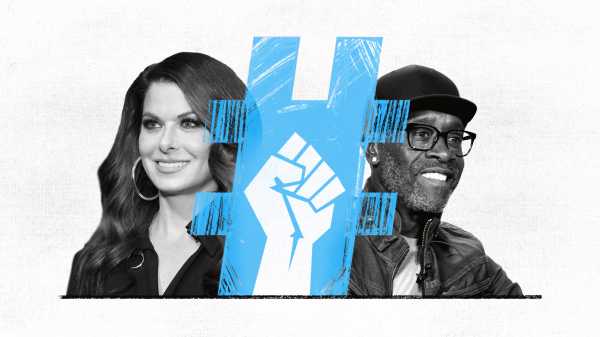
Inside the secret Twitter rooms where Debra Messing, Don Cheadle, and the rest of the celebrity #Resistance organizes
Progressive influencers, activists, and presidential campaigns are organizing behind digital closed doors.
By
Emily Stewart
Jan 24, 2020, 7:30am EST
Share this story
-
Share this on Facebook
-
Share this on Twitter
-
Share
All sharing options
Share
All sharing options for:
Inside the secret Twitter rooms where Debra Messing, Don Cheadle, and the rest of the celebrity #Resistance organizes
-
Reddit
-
Pocket
-
Flipboard
-
Email
In October, television actress Debra Messing had a concern a lot of Democrats share: that the party won’t rally around the eventual 2020 presidential nominee. She came across a New York magazine story that highlighted Bernie Sanders saying the 2016 primary was “rigged” and declining to affirm he’d support the Democratic White House candidate if it isn’t him. “This is UNACCEPTABLE,” the Will & Grace star remarked.
Actor Don Cheadle was quick to chime in: “What’s up with the date of that article?”
“WTH?” Messing replied, apparently then realizing that the piece had been published last June.
The discussion took place on Twitter, but not in a public space. It happened in a private room made for progressive celebrities and activists to communicate and work in tandem to spread messages online. It’s a growing tactic on the left, designed to piggyback on a social media coordination strategy employed successfully on the right and intended to harness the power of Hollywood stars and high-profile activists who already lean Democratic. A sort of cabal of #Resistance influencers, if you will.
The Messing-Cheadle exchange (after which Messing apparently chose not to tweet the article) took place in an under-the-radar, invite-only network called the Decency Collective, an effort to harness the potential of progressive celebrities and activists online. Under its umbrella are dozens of private Twitter direct message rooms organized around specific issues, geographies, and events where left-leaning influencers gather.
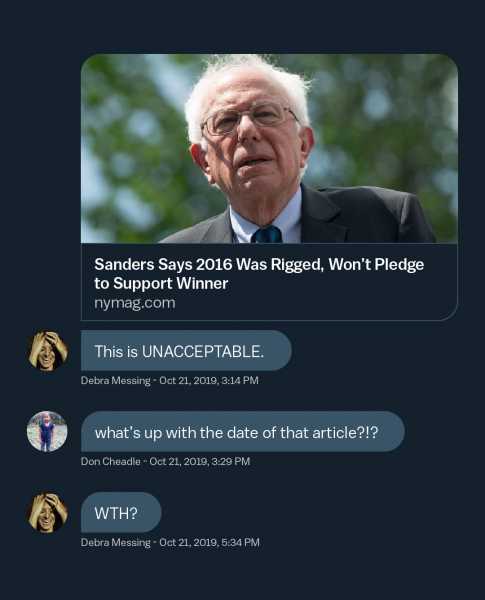
Among the names I noticed of those involved are many that people might recognize: Gabrielle Union, Alyssa Milano, Jon Cryer, Sarah Silverman, Ben Stiller, Tom Colicchio, Jason Long, Mark Ruffalo, Adrian Grenier, Akilah Hughes, Piper Perabo, W. Kamau Bell, Ady Barkan, Jason Kander. Representatives from the presidential campaigns of Sens. Elizabeth Warren and Bernie Sanders, among others, are in the mix as well.
Though the conversation is often serious, it’s also occasionally lighthearted, like any online community can be.
In November, someone dropped in a tweet about Piper Perabo, the actress of Coyote Ugly fame, getting arrested at a protest. “Piper’s in the clink again folks,” he wrote. Cheadle responded: “she’s such a jailbird.”
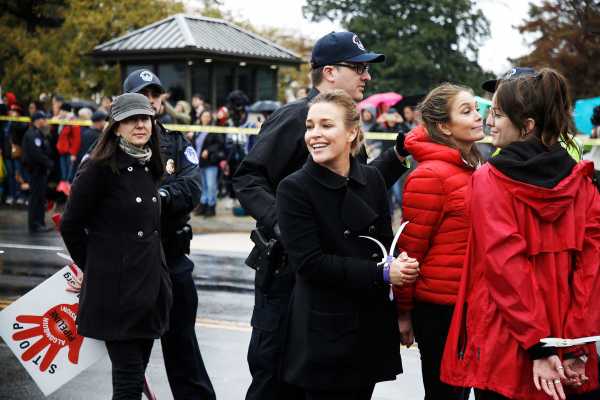
The initiative is being spearheaded by Rob Bennett, former creative communications director at the New York City mayor’s office under Bill de Blasio. His LinkedIn profile lists him as working on “something new.” In an email to Vox, Bennett said the Decency Collective project is one that currently only lives as the DM rooms “where folks I happen to know gathered and tried to figure out how to use Twitter for good.” He said he has a nascent nonprofit, and he also appears to be running a consultancy, both of which are dedicated to harnessing the power of progressive influencers online.
Many of the Decency Collective groups are hubs for ongoing conversations, but the influencers are also sometimes rallied around specific causes and events, such as Supreme Court Justice Brett Kavanaugh’s confirmation hearings and President Trump’s impeachment. And Democrats in both Wisconsin and Minnesota enlisted Bennett’s stable of #Resistance celebrities to boost specific fundraising initiatives in 2019 — and, according to public filings with the Federal Election Commission, paid a company he runs thousands of dollars for that service.
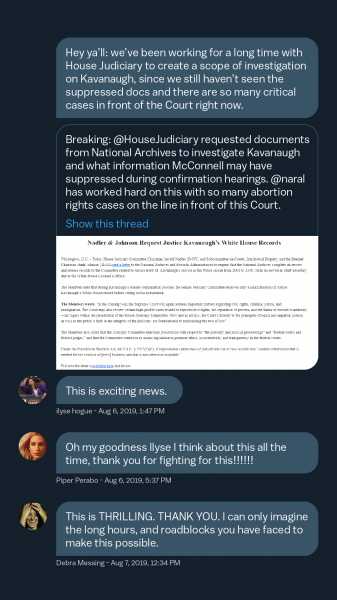
In recent weeks, I spoke with multiple people familiar with the Decency Collective, many of whom spoke on the condition of anonymity in order to talk candidly about the matter, and viewed conversations in two of the DM rooms. Members of the rooms and those familiar with Bennett’s undertakings emphasize that the initiative is not a nefarious one. It’s a genuine effort to organize influential voices on the left and promote progressive causes with them, akin to political organizing tactics that long predate the internet.
“Politics is a subset of how people interact with each other,” said Alan Rosenblatt, principal at the progressive digital strategy group Unfiltered Media who has trained political groups to use Twitter DM groups as part of their social media strategies. “So it makes sense that with a technology that helps people interact, politics gets into it.”
Republicans do it. So do K-pop fans. Democrats are doing it, too — groups like Bennett’s, political campaigns, and ad hoc organizers alike.
Inside the space, the #Resistance influencers gather
The point of the Decency Collective groups and ones like it, to put it loftily, is to amplify progressive messages, counter conservative messages, and recruit and organize others around the cause. In practice, this translates to a lot of retweet requests and discussions about what’s going on in the news and how to approach certain topics and stories.
“It’s very, like, ‘Hey, I wanted to make sure you saw this so if you’re excited about it, you can share it,’” one member of the group said. “It’s nothing new in terms of talking points or information in terms of people who want to be supportive.”
For example, in August, Ilyse Hogue, the president of the abortion rights group NARAL, dropped into a group called DC-PeoplesResponse one of her tweets of news that the House Judiciary Committee had requested documents on Kavanaugh and Senate Majority Leader Mitch McConnell. Perabo, who has 167,000 Twitter followers and is one of the most active members of the group, thanked Hogue “for fighting for this,” and Messing responded that it was “THRILLING.”
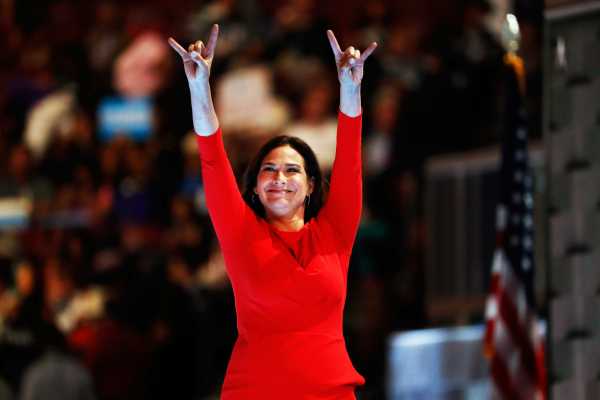
In October, Messing dropped in one of her own tweets with a video of South Carolina Sen. Lindsey Graham from 1998 during Bill Clinton’s impeachment trial. “That was great Debra, RTed!” Hogue responded. Messing thanked her and congratulated her on a recent profile. “What wonderful company,” she remarked.
Impeachment has also been a major organizing touchpoint in the Decency Collective network. The day House Speaker Nancy Pelosi announced a formal impeachment inquiry into President Trump in September, Perabo advised the PeoplesResponse members to have “disciplined messaging,” including a reminder to “stay solemn” and “let the moment land.” The next day, Messing advised the group to follow Pelosi’s lead and use the hashtag #ExposeTheTruth. It’s not clear whether anyone followed her lead.
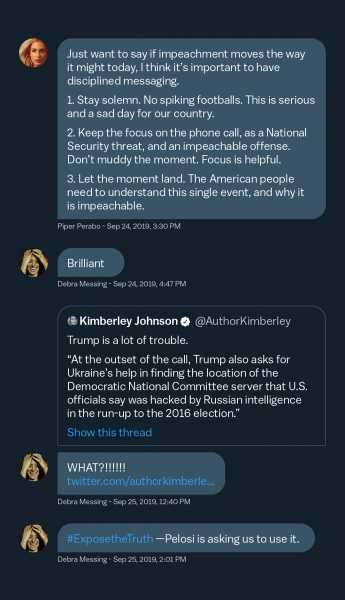
Ahead of protests across the country on the eve of the House impeachment vote, the Decency Collective account (likely run by Bennett) sent a message to the group: “We have a team organized to support influencers to maximize their promotion impact for these rallies. If you want to learn how we might be able to help you, please DM me directly.”
Before launching his presidential bid, billionaire Tom Steyer joined a Decency Collective group focused on impeachment, one person who was part of the group told me. Initially he was welcomed, but once he decided to run for the White House, the sentiment quickly turned. “Everyone was like, ‘What the fuck, this isn’t about you,’” the person said. Steyer left the group, which has since been shut down.
Across the groups I saw, some members were more active than others, if they appeared to participate at all, and it was unclear how effective the coordination is. Those I spoke with say activity has slowed over the past year, but the conversation hasn’t ended altogether. In one New York-specific Decency Collective group, Perabo put out a call for emcees for a “Resistance Got Talent” fundraiser, Milano invited members to come to events featuring her in the city, and Survivor alum Eliza Orlins shared a notice on New York City ballot initiatives. Two sources told me the New York group sometimes organizes meetups, including one held in the home of one of the members.
This is a way to bring traditional political organizing online — and possibly cash in
According to one former city hall employee, Bennett talked about the idea of forming progressive influencer groups while he was still at the mayor’s office. A political operative said the organization’s structure was unclear to him at the time. “It’s definitely an interesting idea; Twitter DM groups are really effective for celebrities, too, who probably have insane inboxes. It’s a way to directly engage with a celebrity,” the operative said. “People are organizing in all different corners of the internet.”
In an email to Vox, Bennett said that the Decency Collective project only lives on in DM rooms, but his project called Collective Impact is “exploring ways to help people make the impact that they want to achieve online.” He said he has no full-time staff beyond himself and is “working to find ways to support everyone who wants to use their power to make the world a better place.”
“The last three years have seen an outpouring of enthusiasm from people who want to make a positive difference, including celebrities, influencers, and others with large followings online. Everyone with a social media platform has an opportunity to speak to their followers, and it seems like a real opportunity for change,” Bennett said. “I’ve partnered with a few organizations since 2017 to explore case studies in influencer engagement, but am still in the process of systematizing the data to figure out how it all works.”
Bennett also appears to be operating an LLC registered in New Jersey tied to influencer activism called the Influencer Lab. FEC filings show both the Wisconsin Democratic Party and the Minnesota DFL paid the LLC thousands of dollars for fundraising consulting — as in, tweets from Bennett’s stable of influencers. The Wisconsin Democrats enlisted the organization for its #CheddarBomb fundraiser in July, and the Minnesota DFL for its #MoneyBlizzard around a Trump rally in October. It’s not clear whether many, or any, of the influencers involved are aware of the specifics of Bennett’s operation.
Ken Martin, chair of the Minnesota DFL, said he started out very skeptical of the idea, but once he saw its effectiveness, he got on board. “You can just imagine how you are using the power of technology to instantly organize, communicate, and fundraise. And Trump did that with such sophistication in 2016 that we were really caught flat-footed, and now Democrats are playing catch-up at this point,” Martin said.
Republicans have been organizing in private Twitter groups for some time
It is worth noting that the idea of using direct message groups to coordinate influencers, promote hashtags, and push for or against certain viewpoints is widely used across Twitter, including in politics. In 2017, Shawn Musgrave reported on the right’s effective use of Twitter rooms to spread the MAGA word and other pro-Trump messages — so effective that many “dismissed their staggering output as inflated by automated ‘bot’ accounts run by expert computer programmers, whether foreign agents or domestic trolls.” And many on the left echo Martin’s point that they’re just catching up.
“If you think about it in the sense of a grassroots movement, it’s very similar to what it’s like in the field in terms of politics,” said a Democratic social media strategist who has experience creating DM groups on the left. “The Republicans on the Trump side, they kind of cultivated this thing.”
Twitter introduced group direct messaging in 2015, and groups are limited to 50 users. Though the user experience has some room for improvement, their big upside for political organizing is they allow users to see the tweets others have dropped in and decide then and there whether to retweet them and engage instead of needing to click through to even preview them.
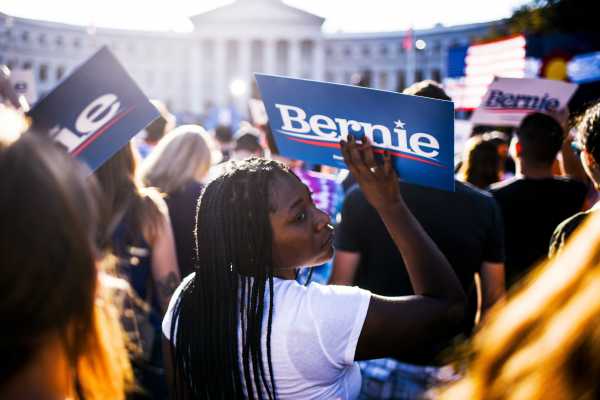
Rosenblatt told me he’s seen multiple examples of direct messaging groups between both high-level activists and influencers and rank-and-file activists online. He helped Our Revolution, the progressive group spun out of Bernie Sanders’s 2016 campaign, with its online organizing, including use of this tactic, and wound up in a Southern California group with actor John Cusack.
“I don’t know how many there are, but I know there’s enough that a lot of the influencers find themselves in a lot of DM groups here and there, and it’s getting overwhelming, so there’s some management challenges involved in this,” he said, noting that the groups are just one way people are organizing themselves online. And while some are deliberately organized, most are put together ad hoc, and there are no influencers in them. It’s political organizing, but for the online world. “It’s extremely authentic and credible and coming from real people,” Rosenblatt said.
Sourse: vox.com






